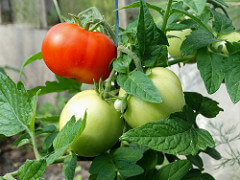Posted on 03/24/16 by Simply Organic Turf Care

Growing organic fruits and veggies in your own backyard is such a rewarding experience. You can be certain of what your food has been exposed to (or not been exposed to) and enjoy more nutrient-rich fruits and vegetables than those on your grocer’s shelves—and all at a savings! Spring is a great time for planting but before you get started, there are some key things to familiarize yourself with to ensure your gardening efforts are successful.
- Selecting Fruits and Vegetables: Do a little background research on plants that are appealing to you to see if your yard has adequate conditions for successful growth. Below are some popular Georgia selections to consider as you plan your garden. You can find more options here. Once you’ve decided on your varieties, purchase your seeds and get planting!
- Vegetables: tomatoes, cucumbers, sweet corn, lima beans, pole beans, eggplant, peppers, squash, collards and turnips
- Fruits: cantaloupe, watermelon and strawberries
- Planting
- Timing: March through May is a great time for planting in Georgia, after the final killing frost. Likewise, mid-July through September, before the first killing frost is another good time for planting fruits and vegetables.
- Method: Make sure the soil is sufficiently dry and begin by preparing the soil in your designated garden area. Use a tiller to cultivate the soil and incorporate some of your home compost or organic fertilizer. You can plant in rows are beds. Beds will allow you to plant more in a smaller space and consolidate maintenance tasks. Read the package instructions on each seed for planting depths and spacing. Remember, not all seeds with sprout, so sow them thicker than the intended final spacing. Cover seeds with a thin layer of organic potting soil, patting down to ensure full contact with the soil.
- Maintenance
- Pests and Diseases: You can help reduce pests and diseases in your organic garden by keeping it free of debris, watering effectively (avoid overwatering), balanced fertilization, and rotating crops when replanting. Remember, not all insects are bad. In fact some are quite beneficial.
- Watering: Water smarter and only as needed. If you notice signs of wilting and dry, cracking soil, it’s time for a deep soaking. Consider drip irrigation for efficient watering.
- Fertilizing: Add nutrient rich fertilizer or compost throughout the growing season as opposed to applying it all at once. Add it to the side of your plants and water to incorporate into the soil. Remember, healthy soil is the key to success in organic lawncare.
- Mulch: maintain mulch between rows to help prevent weeds, retain moisture, and moderate soil temperature.
- Trim: Thin your plants as they begin to crowd each other, usually around 2-3 inches tall. This too will help reduce pests and diseases.
Expand beyond organic herb gardening and enjoy the sweet satisfaction of homegrown, organic fruits and vegetables for your entire family to enjoy. Include your kids in the journey and there’s a good chance they’ll eat more of these healthy treats than ever before!

